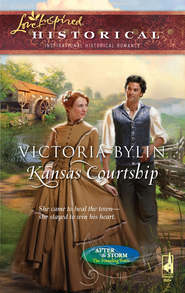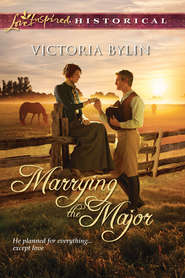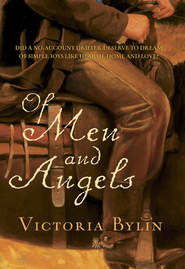По всем вопросам обращайтесь на: info@litportal.ru
(©) 2003-2024.
✖
Abbie's Outlaw
Настройки чтения
Размер шрифта
Высота строк
Поля
“Is there any chance she’s been in touch with him?”
“None at all. They aren’t close.”
As they approached the telegraph office, he asked the question he’d been dreading. “What does she look like?”
For the first time since leaving the train, Abbie smiled. “Probably like a boy. She just turned fourteen, but she stole clothes from her friend’s brother and chopped off her hair. The disguise won’t be convincing for long, but right now she’s a beanpole and about my height.”
John had to admire the girl’s spunk. “What color is her hair?”
“Dark and straight.”
Like mine, he thought. He wondered if Robert’s coloring had been dark, but it seemed unlikely. Robbie’s hair was the color of sand.
“What about her eyes?” John asked.
“They’re brown.”
He’d been hoping to hear “blue like Robbie’s,” not that it mattered. Brown eyes were as common as mud. At least half the folks in Midas had brown eyes. John lifted a piece of paper off the counter. “Is there anything else I should know?”
“Only that she doesn’t have much money. If she went to Bitterroot, the train fare cost more than I thought.”
At the mention of the town where he’d been convicted of murder, John stifled a frown. He remembered every building, every alley, but especially the courthouse where he’d been convicted for the deaths of Ben Gantry’s sons. If anyone had cause to hate John, it was Ben. Without knowing it, Susanna was spitting on the graves of his sons.
Seeing the worry in Abbie’s eyes, John looked for consolation and found it in the presence of his old friend. Silas had knocked sense into John when he’d been dumped in prison, kicking and shouting obscenities at the guards. “There’s a bright spot in this mess,” he said to Abbie. “I have a friend who’ll look for her if I ask.”
“Who?” she asked.
“His name is Silas Jones. We met in prison, but don’t judge him for it. He’s an ex-slave with more scars on his back than skin. He talked me through some terrible times.”
Silas had known how to get along with the guards. He’d also known how to pray. After John had taken the beating of his life, he’d been begging God to let him die. Instead the good Lord had sent Silas. Thanks to that wise old man, John could sleep at night, alone and usually without dreams. Never mind that he woke up lonely and lustful. He’d made that choice for a reason and he’d be wise to remember it, especially with the scent of Abbie’s skin filling his nose.
After jotting the telegram on a notepad, he asked the clerk to send it immediately. The rustle of Abbie’s dress dragged his gaze to her reticule where she was digging for coins. “How much will it be?” she asked the clerk.
John interrupted. “I’ll take care of it.”
“No, I insist. She’s my daughter.”
Maybe so, but judging by her worn-out clothes, Abbie didn’t have a lot of money. He’d assumed that Robert had been well-to-do, but the man could have gambled away every cent. For all John knew, he’d left Abbie in debt with two children to feed. It would explain the air of secrecy about her. Before she could find her coins, he opened his billfold and slapped a greenback on the counter. “Take it out of this,” he said to the wire operator, a man named Bill Norris.
“No!” Abbie looked at Bill. “How much is it?”
The operator named an amount that would have made a Rockefeller grumble. From the corner of his eye, John saw Abbie pale as she extracted two small bills.
At the sight of her tense fingers, he realized more was at stake than money. She was drawing a line between his responsibilities and hers, but he couldn’t let her pinch pennies. The train fare had to cost a hundred dollars each, and lodging would be expensive, too. Since the telegram was the least of her worries, he surrendered with a smile. “Want to flip a coin to see who pays?”
“Absolutely not,” she said. “And please don’t argue with me. I get enough of that from Robbie.”
“All right,” John said easily. But the conversation wasn’t over. If he asked his housekeeper to live in, Abbie and her son could stay at the parsonage. It wouldn’t cost her a dime. They’d be able to talk in private and get to know each other again. He’d have company at meals, even at breakfast. Hellfire! What was he thinking? Privacy was the last thing they needed, especially with Judas-down-there wanting to share more than toast and scrambled eggs.
John slid his billfold into his coat pocket. He’d be wise to get Abbie and her son settled at the Midas Hotel as soon as possible. As for the bill, he’d pay it. He owed it to her, and probably more in view of her description of Susanna. But he’d face that problem later.
As she stepped into the lobby of the Midas Hotel, Abbie inhaled the cool air with gratitude. The accommodations were modest by Washington standards, but the hotel had a lived-in charm. A side table held glasses and a pitcher of iced tea, and four petit point chairs were arranged in the center of the room. She was about to approach the counter when the whistle of a canary called her attention to an iron cage near the window. With the sun streaming through the bars, the little fellow puffed up and sang his heart out.
Abbie loved birds. She fed dozens of them in her backyard in Washington, and she missed the way they calmed her worries. From the cage, her gaze traveled to a doorway that led to a café where she and Robbie could take their meals if it wasn’t too expensive. Overall, things could have been worse. With a little luck, she could take a bath and a nap before supper. At the sight of her son waiting politely at the hotel counter, she smiled her approval.
“Can I look around?” he asked.
“Sure. Just don’t leave the lobby.”
With John standing at her side, she rang the bell on the counter. A chubby man in a white shirt ambled out of the back room and smiled at them both. “Howdy, Reverend. What can I do for you folks?”
“Nate, this is Abigail Windsor. She’s a friend of mine. She and her son need a suite for a few weeks.”
“A single room will be fine,” Abbie said. She craved the luxury of private space, but she couldn’t afford it.
When Nate glanced at John, she suspected a message was being passed. She ached for a bed of her own, but she didn’t want to owe John any favors. “How much will it be for just a room?” she insisted.
“Same as for the suite,” Nate said. “The singles are all taken, so I’ll give it to you at a discount. The windows face the alley, but the beds are soft.”
At the thought of a feather mattress, Abbie no longer cared about owing favors to anyone. “That’s kind of you. I’ll take it.”
As the clerk turned to the wallbox holding keys, she reached for the pen and signed the register. “Is it possible to order a bath?”
“Sure thing, ma’am.”
She was imagining steamy water when the casual scuff of her son’s shoes caught her attention. Robbie had just stepped back into the lobby with his hands jammed into his pockets and a sly look in his eyes. Abbie’s stomach lurched. The last time she’d seen that expression had been on the train when he’d stolen the orange. Needing every advantage, she straightened her spine to gain a few inches on the boy who could almost look her in the eye.
“I told you to stay in the lobby,” she said firmly.
“I did.”
“No, you were in the restaurant.”
“Isn’t that part of the lobby, Mother?”
His tone made her grit her teeth. Up until Robert’s death, she’d been “Ma” and sometimes even “Mama.” Abbie was stifling her frustration when she heard a cynical chuff from John. The good Reverend was leaning casually against the counter and giving Robbie the toughest stare she had ever seen.
“Son, you have a choice,” he said. “You can put back the money you just stole, or you can make your problems worse by lying.”
John’s eyes were rock-hard, but below the intensity she saw the hope that Robbie would tell the truth. Unfortunately her son had no such compunction. Just as she expected, Robbie screwed his face into an arrogant scowl. “I’m not a thief!”
“Sure you are,” John replied. “You took money that wasn’t yours.”
“Mother!” Robbie hooked a thumb at John. “He’s insulting me.”
Abbie arched an eyebrow. “I think the Reverend is being kind.”
John tsked his tongue. “You have a lot to learn, kid. First off, don’t waste your breath on straight denials. Muddy the water with a bit of truth. If I were you, I’d say something like, ‘I found some change on the floor, but that’s all.’”











